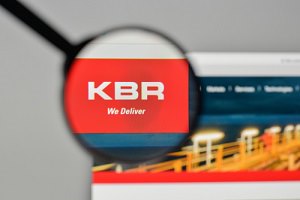After 12 Years of Litigation, Constantine Cannon Settles the Largest Iraq War Fraud Case Ever

In the largest settlement of a case alleging fraud during the Iraq War, KBR Services has agreed to pay $108.75 million to resolve a whistleblower case brought by two Constantine Cannon clients under the qui tam provisions of the False Claims Act. The settlement followed 12 years of litigation, during which KBR and its lawyers fought every step of the way.
While the size and scope alone make the settlement groundbreaking, the result is even more remarkable because the U.S. Justice Department did not participate in the litigation; the two whistleblowers and their attorneys shouldered the entire load. In recognition of the extraordinary efforts of the team, the Justice Department paid the whistleblowers 29% of the settlement (out of a 30% maximum), approximately $31.5 million. And, in addition to the $108.75 million paid to settle the case, KBR paid $34.95 million in attorneys’ fees and costs to Constantine Cannon and our co-counsel.
A Groundbreaking Settlement for Claims of Defense Contracting Fraud
Without question, the United States’ invasion of Iraq in 2003, and its continuing military interventions through 2011, took an enormous toll in human, political, and economic terms. Among the costs of the Iraq War are costs imposed by fraud, with Congress’ Commission on Wartime Contracting estimating that the U.S. government lost $31 – $60 billion due to waste and fraud in the Iraq War. Despite this massive loss of taxpayer funds to fraud, few cases have successfully recouped that money from defense contractors.
 The qui tam provisions of the False Claims Act authorize whistleblowers to bring lawsuits on behalf of the United States against contractors who defraud the government. If the government does not join the case, the whistleblowers and their lawyers can continue the case through litigation on the government’s behalf.
The qui tam provisions of the False Claims Act authorize whistleblowers to bring lawsuits on behalf of the United States against contractors who defraud the government. If the government does not join the case, the whistleblowers and their lawyers can continue the case through litigation on the government’s behalf.
That is precisely what happened here, with the whistleblowers and their attorneys proceeding with the case after the U.S. declined to intervene. Lead counsel Eric Havian noted that “this was one of the most grueling and extended cases we have experienced. KBR hired four of the nation’s largest litigation firms, who sent a clear message to our team not to expect any settlement at all. For twelve years, they were true to their word.”
Case Background: The Whistleblowers Claimed KBR Overcharged the U.S. Government During the Iraq War
The case began in 2011 when the two whistleblowers, Geoffrey Howard and Zella Hemphill Anderson, filed a qui tam action under the False Claims Act. Both worked for KBR, the sole contractor under the $30 billion+ LOGCAP III contract, which tasked KBR to provide support for the large contingent of U.S. troops stationed in Iraq and Afghanistan. The company supplied everything from toilet paper to dining halls, air conditioners to truck tires.
To make efficient use of taxpayer funds, the LOGCAP contract required KBR to “cross-level” material. Cross-leveling is an unusual name for a very simple idea – before buying new material, such as electrical cable, KBR was required to make sure they did not already have excess of the same cable sitting in a warehouse in-theater. If KBR found it had excess inventory, it was supposed to “cross-level” it, i.e., use that inventory rather than buy more cable. Cross-leveling not only saved taxpayers money, but it also got the material to the end-user much more quickly than buying new, since it did not need to be transported into the country.
 Howard and Anderson discovered that KBR was routinely ignoring the cross-level requirements. Howard was in KBR’s IT group and wrote a computer program revealing hundreds of millions of dollars in excess materials. Anderson, whose job was to facilitate cross-leveling, discovered that KBR employees manipulated its inventory management system such that vast amounts of material in inventory were “invisible” to her or anyone else trying to cross-level.
Howard and Anderson discovered that KBR was routinely ignoring the cross-level requirements. Howard was in KBR’s IT group and wrote a computer program revealing hundreds of millions of dollars in excess materials. Anderson, whose job was to facilitate cross-leveling, discovered that KBR employees manipulated its inventory management system such that vast amounts of material in inventory were “invisible” to her or anyone else trying to cross-level.
For example, internal documents revealed that KBR was ordering new electrical wire when it had up to 65 years’ worth of inventory of such wire on hand. Similarly, KBR had enough stock of four other items at one site to last 32.9 years, 15.6 years, 13.0 years, and 12.7 years. The complaint cited many other similar situations, and the whistleblowers’ expert witness calculated that KBR had over-ordered at least $340 million worth of unnecessary materials. Much of it was turned over to the Government of Iraq or abandoned at the end of the War.
Howard and Anderson complained internally about this waste, but they were routinely ignored. KBR had little incentive to listen, because the company was paid for every dollar it spent procuring the materials, plus profit. Howard was relegated to a warehouse to work alone, with few real tasks to perform – an experience that, unfortunately, many of our whistleblower clients have had.
A Twelve-Year Fight for Accountability
The government declined to join the case, so the whistleblowers proceeded on their own. They were represented by three law firms, including Constantine Cannon, which acted as lead counsel.
Constantine Cannon Partner Daniel Vitelli noted that “we took our role as lead counsel seriously and devoted the resources necessary to litigate a case of this importance and magnitude. The evidentiary record alone was enormous. It included millions of documents, extensive data, and dozens of depositions. KBR’s lawyers litigated hard every step of the way, but we were up to the challenge.”
Years of hard work by the team paid off, as they uncovered evidence showing that KBR was aware that it was failing to perform under its contract. One of KBR’s top four executives in Iraq stated in an email “We are purchasing $5 M[illion] per day when we’ve got $1.2B[illion] i[n] excess on hand. At some point, the [Government] is going to put KBR out of business if we keep doing this.” The company also sanitized reports, in the words of one employee “turn[ing] Chicken crap into Chicken soup.” Further, a segment manager who inspected one site found that there had been an “extensive coverup.”
 Litigating a case that the government declines is risky, with statistics showing that defendants win the vast majority of such cases. Constantine Cannon and its co-counsel at Goldberg Kohn and Phillips & Cohen made an early commitment to litigate the matter to its final conclusion.
Litigating a case that the government declines is risky, with statistics showing that defendants win the vast majority of such cases. Constantine Cannon and its co-counsel at Goldberg Kohn and Phillips & Cohen made an early commitment to litigate the matter to its final conclusion.
That resolve was the key to success. According to Havian, “we were told more than once ‘KBR doesn’t settle,’ and repeated settlement overtures by our side were ignored or rejected. The reason there have been so few recoveries of misappropriated War funds, despite the widespread fraud, is that these cases are long and challenging. The $34 million KBR paid to cover the team’s legal fees and costs proves the point.”
As Vitelli observed, “the more evidence we found, the stronger we felt about the case and the harder we pushed. We were ready, willing, and able to try this case before a jury, if that would have been necessary. We are pleased that we were able to reach a successful settlement.”
The final outcome is extraordinary. No other case alleging fraud during the Iraq War has returned as much money to the Treasury as this one, and the efforts of the team were rewarded with 29% of the settlement, close to the 30% maximum reward. But that result is not unusual for Constantine Cannon: we have a track record of obtaining the highest possible awards for our whistleblower clients.
Read More:
- Press Release: Iraq War Whistleblowers Represented by Constantine Cannon Secure $108.75 Million Settlement with KBR
- More on This Case: Constantine Cannon Whistleblower Suit Against KBR Will Go Forward: False Certification of Compliance Not Needed To State a Claim (October 2015)
- Government Contract Fraud
- The False Claims Act
- The Constantine Cannon Whistleblower Practice Group
- Our Whistleblower Team
- Our Whistleblower Successes
Tagged in: Contract Non-Compliance, Defense Contract Fraud, FCA Federal, Government Procurement Fraud,